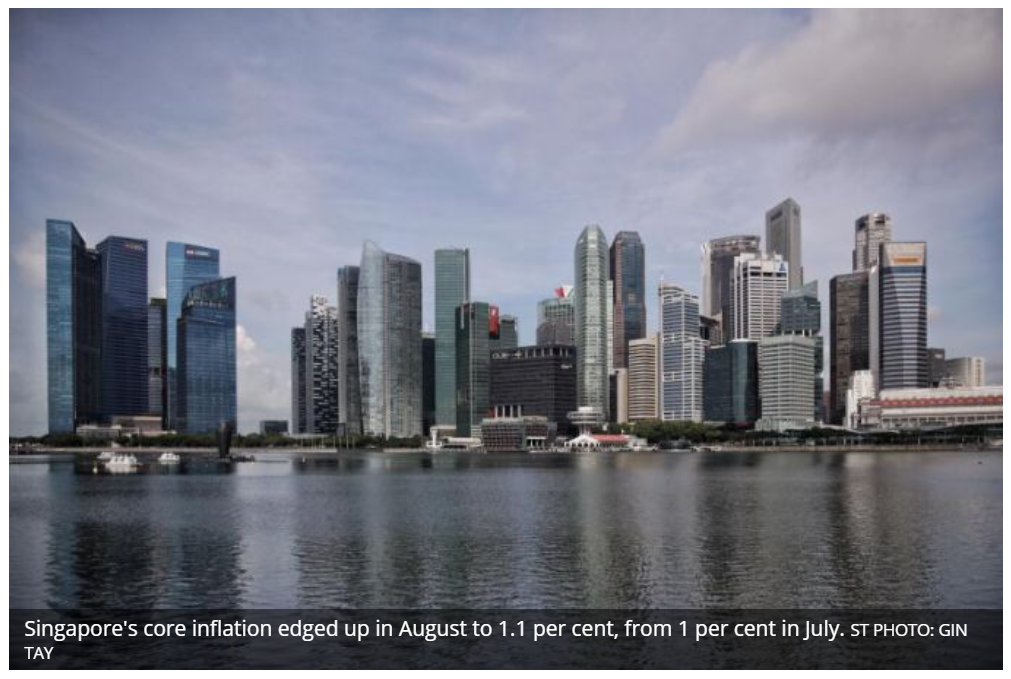Singapore’s core inflation edged up to 1.1% in August; MAS, MTI maintain forecasts
SINGAPORE’S core inflation edged up in August to 1.1 per cent, from 1 per cent in July, with the Monetary Authority of Singapore (MAS) and the Ministry of Trade and Industry (MTI) maintaining their inflation forecasts ahead of the MAS’s next policy meeting in October.
Department of Statistics (Singstat) consumer price index (CPI) figures on Thursday showed headline inflation easing to 2.4 per cent, down from 2.5 per cent in July, in line with economists’ expectations.
The fall was due to lower private transport inflation of 10.8 per cent, easing from 12.6 per cent. This more than offset the rise in core inflation, which excludes accommodation and private transport.
Accommodation inflation was 1.7 per cent, up from 1.4 per cent the month before, with a stronger pickup in housing rents.
The rise in core inflation was driven mostly by higher food inflation of 1.5 per cent, up from 1.1 per cent in July, and a smaller decline in the cost of retail and other goods, of -1 per cent compared to -1.2 per cent in July.
Services inflation edged down to 1.2 per cent on a steeper fall in telecommunication services fees, while electricity and gas inflation fell to 9.7 per cent.
Most Singstat expenditure categories – distinct from the MAS and MTI categories – saw positive inflation in August. The exceptions were clothing and footwear (-6.2 per cent), communication (-2.2 per cent), and miscellaneous goods and services (-0.1 per cent).
Barclays economist Brian Tan noted that despite core inflation edging up, “there remain few signs of substantial demand-pull pressures and the official statement appeared to downplay external inflation pressures”.
The MAS and MTI’s outlook remained largely unchanged from the previous month. They said that external inflation has remained elevated, but added that it is showing signs of moderating, as base effects fade; while continuing to note that domestic uncertainty amid Singapore’s transition to an endemic Covid-19 stage could weigh on consumer sentiment and dampen domestic price increases in the near term.
Core inflation is expected to increase gradually in the coming months. But with accommodation inflation possibly continuing to rise on the back of strong demand for rental accommodation, the MAS and MTI now see this as supporting “a modest rise” in headline inflation in the fourth quarter, in contrast to their earlier expectation for headline inflation to ease.
For the full year, core inflation is still expected to average zero to 1 per cent, and headline inflation, 1 to 2 per cent.
Maybank Kim Eng economists Chua Hak Bin and Lee Ju Ye maintained their full-year forecasts of 1.8 per cent and 1 per cent for headline and core inflation respectively, but raised their 2022 headline inflation forecast to 1.5 per cent, from 1.2 per cent previously. They expect persistent supply chain disruption to keep energy, food, and freight costs elevated.
UOB economist Barnabas Gan sees inflation pressures as likely to be transitory, given dissipating low base effects from 2020 and an uptick in unemployment in July.
“The lingering Covid-19 risks should continue to limit commercial rents, thus capping overall business cost pressures,” he added.
Nonetheless, UOB has upgraded its headline inflation outlook to 1.8 per cent for 2021, from 1.4 per cent before.
In contrast, JP Morgan analyst Ong Sin Beng sees inflationary pressures building, with elevated supply-side pressures and an earlier-than-expected normalisation of economic activity.
The focus on raising incomes of low-wage workers “suggests that labour cost pressures will be biased to the upside in the coming quarters”, he added. He expects the MAS to pre-emptively shift the slope of the Singapore dollar nominal effective exchange rate (S$NEER) from its current flat position to a positive slant in October, possibly raising the mid-point as well.
But this is still a minority view among economists, most of whom expect the MAS to hold steady in October. Barclays’ Mr Tan is among those who continues to expect the MAS to leave foreign exchange policy settings unchanged, though noting a risk of a 100 basis points steepening of the S$NEER slope.
“Economic output and price pressures do not provide particularly urgent reasons to tighten FX policy, in our view, and we believe the MAS will choose to stay cautious and maintain the status quo – in line with the rhetoric from senior government officials as the number of Covid-19 infections and seriously ill cases have risen,” he added.
Source: https://www.businesstimes.com.sg/government-economy/singapores-core-inflation-edged-up-to-11-in-august-mas-mti-maintain-forecasts


 Thailand
Thailand




